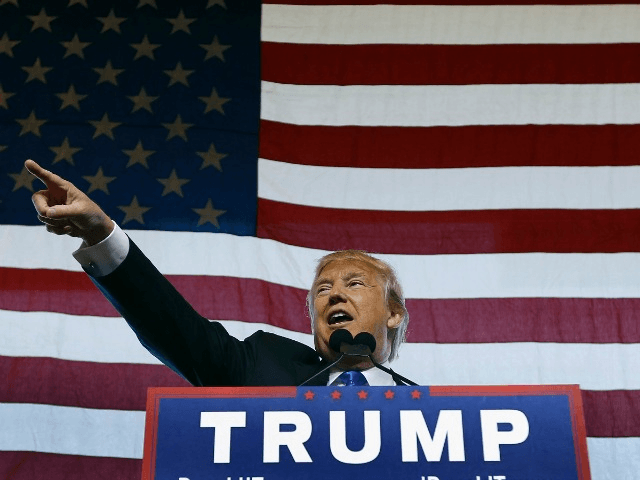Speculation is mounting over the identity of a purported top-secret intelligence source who was part of the FBI’s investigation into the Trump campaign.
Such a source was first confirmed last week by leakers to the Washington Post. The leakers told the Post that senior FBI and national intelligence officials tried to stop House Intelligence Committee Chairman Devin Nunes from receiving information that could “endanger a top-secret intelligence source.”
The leakers also revealed the source is a “U.S. citizen who has provided intelligence to the CIA and FBI.”
They also revealed that providing the information about the source could “damage relationships with other countries that serve as U.S. intelligence partners” — meaning that the source likely worked with other nations.
Their panic was reportedly set off by a recent request for the information from Nunes to Attorney General Jeff Sessions on April 24. The Justice Department initially rejected his request, but acquiesced, providing him with the information last Wednesday.
Despite claims that releasing the information would endanger lives, House Speaker Paul Ryan (R-WI) told reporters on Thursday that the request was “wholly appropriate” and overdue.
“I spent some time looking at the HPSCI request, at the HPSCI investigation. I think this request is wholly appropriate. It’s completely within the scope of the investigation that’s been ongoing for a while with respect to FISA. I actually think that this is something that probably should have been answered a while ago,” he said.
Although the leakers may have wanted to take aim at Nunes, the revelation of a top secret intelligence source has prompted new questions over whether the CIA and the FBI tried to ensnare members of the Trump campaign in order to launch an investigation of the campaign.
Wall Street Journal‘s Kimberley Strassel, who believes she has identified the source based on leaks and her own reporting, told Fox News on Friday, “It does look as though indeed, there was an FBI attempt — a successful one, to basically go out and spy with a human asset on the Trump campaign.”
“When the FBI talks about a source, the talk about someone who is an average citizen who uses their credentials, their job as a way of spying for the agency,” she said. “We can take that to mean that there was somebody interacting with the Trump campaign and reporting back to the FBI, which means the FBI was using human intelligence to spy on a presidential campaign.”
“It is hugely disconcerting,”she wrote Thursday in a column, referring to Obama officials unmasking the names of Trump campaign officials to monitor their conversations. “It would also be a major escalation from the electronic surveillance we already knew about, which was bad enough.”
Information about the top secret intelligence source could answer lingering questions about how the FBI’s probe was started in the first place.
Democrats initially latched onto the infamous Trump dossier as evidence that prompted the investigation into the Trump campaign and whether it colluded with Russia.
However, after it was exposed as opposition research paid for by the Hillary Clinton campaign and the Democratic National Committee, leakers told the New York Times that the investigation started after an Australian diplomat passed on a tip based on a drunken conversation he had with Trump campaign volunteer George Papadopoulos in May 2016.
But Strassel points out that many questions remain. She wrote:
“The players in this affair—the FBI, former Director Jim Comey, the Steele dossier authors—have been suspiciously vague on the key moments leading up to that launch date. When precisely was the Steele dossier delivered to the FBI? When precisely did the Papadopoulos information come in?
“And to the point, when precisely was this human source operating? Because if it was prior to that infamous Papadopoulos tip, then the FBI isn’t being straight. It would mean the bureau was spying on the Trump campaign prior to that moment. And that in turn would mean that the FBI had been spurred to act on the basis of something other than a junior campaign aide’s loose lips.”
Strassel said if the source predates that tip on Papadopoulos, things could get very uncomfortable for the FBI. She urged President Trump to move to declassify “everything possible.” “It’s time to rip off the Band-Aid,” she wrote.
Speculation by watchers of the Russia investigation is homing in on two shadowy figures whose names have come up during the investigation — Joseph Mifsud and Stefan Halper.
As the Daily Caller’s Chuck Ross has lad laid out, two weeks before Papadopoulos’ meeting with the Australian diplomat Alexander Downer, Mifsud, a Maltese professor who is suspected of being a Russian operative, met in London with Papadopoulos. Mifsud first told Papadopoulos that a Russian government official had told him about stolen Clinton-related emails.
Halper, a University of Cambridge professor and former U.S. government official who worked in three Republican administrations and has links to U.S. and British intelligence, also had odd interactions with Trump campaign members. In September 2016, Halper contacted Papadopoulos about writing a policy paper on Israeli and Cypriot energy issues, paying Papadopoulos $3,000 for it and covering the cost of a trip to London.
During the trip, Halper asked Papadopoulos about Russia and emails, according to the Daily Caller. Halper also approached Carter Page, inviting him to attend a symposium at Cambridge in July 2016, days after Page was to return from speaking in Moscow.
Halper also works closely at Cambridge with a former head of British intelligence, Sir Richard Dearlove.
Another campaign official said they were contacted by and met with Halper several days before he had reached out to Papadopoulos. Halper’s outreach to Trump campaign members is strange, given that Halper had endorsed Hillary Clinton for president in November 2016 in an interview with Sputnik.

COMMENTS
Please let us know if you're having issues with commenting.